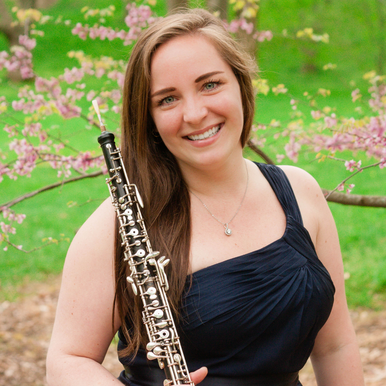Note-worthy Experiences Music Studio
F E A T U R E
Interview with Katrina Kwantes-Oliveira
F E A T U R E
Interview with Katrina Kwantes-Oliveira
Were the oboe and the piano your first instruments? If not, how did you pick them?
The piano was the first instrument I learned, starting when I was 6 years old. Before starting the oboe, I explored other instruments. My twin brother, younger sister, and I all studied voice and ukulele in our formative years - the three of us often sang and played together at senior care facilities and at church. It was not until high school that I began playing a woodwind instrument, and even then, I started off on clarinet in my high school band. Halfway through the year, my band teacher asked if I would like to try the oboe. Excited for a challenge, I jumped at the opportunity to be the special person to play this new, exotic instrument.
What do you like about the oboe?
One of the most striking characteristics of the oboe is its pure, penetrating tone; I love how the tone of the oboe soars above the orchestra like an eagle above the clouds. Another really cool aspect of playing the oboe is that you get to make your own reeds. Although it can be quite a challenge, the thrill of making a reed that does what you want it to do is indescribable. Every day oboists get to rediscover the voice of their instrument - we are constantly adapting and learning.
What do you like about teaching young musicians?
Teaching is always something that has intrigued me. As a young girl, I wanted to be a math teacher; in high school, I became a swimming instructor. I love journeying with students as they learn and grow; being able to help them in the process is fulfilling. My students also teach me a lot - especially about how to approach music with a beginner’s mind and have fun.
What is your favorite type of music to play?
I always have difficulty with this question because there is so much great music from every genre. If I had to choose, I would say baroque music. There is a beautiful simplicity in baroque music and yet there are so many layers to discover. I absolutely love suspensions and appoggiaturas - the musical tension and release can be so satisfying. Baroque music also offers the unique opportunity for the performer to ornament, or “dress-up” the music. As someone who tends to be “by the book”, adding ornaments has taught me a lot about musical expression and freedom.
When you aren’t teaching, what are your hobbies?
I love to practice the art of henna design. It is an Arabic art form in which the henna plant is made into a dye, and applied to the skin to create beautiful, temporary designs (‘tattoos’). I find it so relaxing to do - the only hard part is being patient enough to let it dry! I also really enjoy swimming and playing games with my husband, André.
What is your best advice to students who want to learn a new instrument or improve?
It is really important to have patience with yourself. Learning a new language (which includes music) is difficult and it may sometimes feel that despite a lot of effort, very little progress is made. Hang in there! Try to approach challenges from a new mindset. Struggles help us grow. The skills you develop through learning music will transfer into all aspects of your life!
Learn more about our Oboe and Piano teacher Katrina Kwantes Oliveira on her Teacher Page.
The piano was the first instrument I learned, starting when I was 6 years old. Before starting the oboe, I explored other instruments. My twin brother, younger sister, and I all studied voice and ukulele in our formative years - the three of us often sang and played together at senior care facilities and at church. It was not until high school that I began playing a woodwind instrument, and even then, I started off on clarinet in my high school band. Halfway through the year, my band teacher asked if I would like to try the oboe. Excited for a challenge, I jumped at the opportunity to be the special person to play this new, exotic instrument.
What do you like about the oboe?
One of the most striking characteristics of the oboe is its pure, penetrating tone; I love how the tone of the oboe soars above the orchestra like an eagle above the clouds. Another really cool aspect of playing the oboe is that you get to make your own reeds. Although it can be quite a challenge, the thrill of making a reed that does what you want it to do is indescribable. Every day oboists get to rediscover the voice of their instrument - we are constantly adapting and learning.
What do you like about teaching young musicians?
Teaching is always something that has intrigued me. As a young girl, I wanted to be a math teacher; in high school, I became a swimming instructor. I love journeying with students as they learn and grow; being able to help them in the process is fulfilling. My students also teach me a lot - especially about how to approach music with a beginner’s mind and have fun.
What is your favorite type of music to play?
I always have difficulty with this question because there is so much great music from every genre. If I had to choose, I would say baroque music. There is a beautiful simplicity in baroque music and yet there are so many layers to discover. I absolutely love suspensions and appoggiaturas - the musical tension and release can be so satisfying. Baroque music also offers the unique opportunity for the performer to ornament, or “dress-up” the music. As someone who tends to be “by the book”, adding ornaments has taught me a lot about musical expression and freedom.
When you aren’t teaching, what are your hobbies?
I love to practice the art of henna design. It is an Arabic art form in which the henna plant is made into a dye, and applied to the skin to create beautiful, temporary designs (‘tattoos’). I find it so relaxing to do - the only hard part is being patient enough to let it dry! I also really enjoy swimming and playing games with my husband, André.
What is your best advice to students who want to learn a new instrument or improve?
It is really important to have patience with yourself. Learning a new language (which includes music) is difficult and it may sometimes feel that despite a lot of effort, very little progress is made. Hang in there! Try to approach challenges from a new mindset. Struggles help us grow. The skills you develop through learning music will transfer into all aspects of your life!
Learn more about our Oboe and Piano teacher Katrina Kwantes Oliveira on her Teacher Page.


